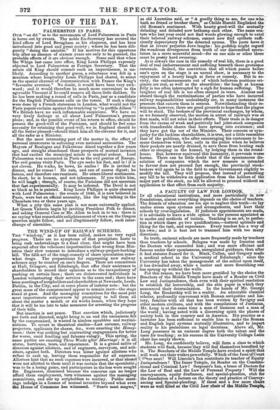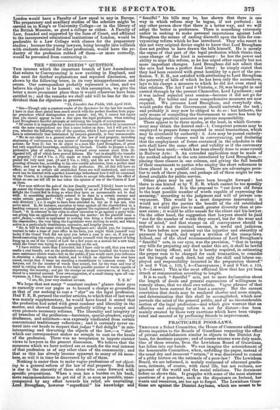A FACULTY OF LAW FOR LONDON.
IN all educational institutions, and more particularly in new foundations, almost everything depends on the choice of teachers. The friends of education are too apt to neglect this truth—to lay undue stress upon systems and arrangements, and hurt their schools by over-legislation. If judicious appointments are made, it is advisable to leave a wide option to the persons appointed as to modes and methods of tuition. Teaching is an art, to perfec- tion in which there go two qualifications,—natural aptitude and liking for the task, and experience. Every teacher has a way of his own ; and it is best not to trammel him with too many directions.
In truth, eminent schools are more frequently made by teachers than teachers by schools. Bologna was made by Irnerius and the Doctors who succeeded him ; and was more efficient and famous under their spontaneous, unregulated guidance, than after it had statutes framed for it. Black, Cullen, and Gregory made a medical school in the University of Edinburgh : since the University has taken the management of the school upon itself, it has dwindled away, while a lustier and more flourishing one has sprung up without the walls.
For this reason, we have been more gratified by the choice the Benchers of the Middle Temple have made of a Reader on Civil Law and Jurisprudence, than even with their spirited resolution to establish the lectureship, and the able paper in which they announced their determination. In the hands of Mr. George Long, the Readership will be a reality. An admirable classical scholar, profoundly conversant with Roman antiquities and his- tory, familiar with all that has been written by Savigny and other modern civilians, and with the compilations of Justinian, Mr. Long is at the same time a man of business and a man of the world ; having noted with a discerning spirit the phases of society both in this country and in America. His practice as a barrister has been sufficient to enable him to make the Roman. and English legal systems mutually illustrative, and to impart reality to his prelections on legal doctrines. Above all, Mr. Long possesses in an eminent degree both the talent and the taste for teaching; as his success in the University College Latin chair has amply shown. Mr. Long, we confidently believe, will form a class to which students will flock, because they will feel themselves benefited by it. The Benchers of the Middle Temple have evoked a spirit that will work out their wishes powerfully. Which of the Inns of Court ul`ves next? Will Lincoln's Inn contribute its teacher of Equity Jurisprudence ? The Inner Temple, its Reader on the Constitu- .tional and Criminal Law? Sergeant's Inn, a brace of Doctors for the Law of Real and the Law of Personal Property ? Will the conveyancers, equity draftsmen, and special-pleaders, club for the foundation of a lecture on the theory and practice of Convey- ancing and Special-pleading. If these and a few more chairs were as well filled as the Civil Law chair of the Middle Temple,
London would have a Faculty of Law equal to any in Europe. The preparatory and auxiliary studies of the scholars might be carried on in King's or University College—or in the library of the British Museum, as good a college as either. A Faculty of Law, founded and supported by the Inns of Court, and affiliated to the incorporated educational institutions of London, would be preferable to a Law College with classes for the preparatory studies ; because the young lawyers, being brought into collision with students destined for other professions, would have the pe- dantry of the profession rubbed off them—or more correctly, would be prevented from contracting it.



























 Previous page
Previous page